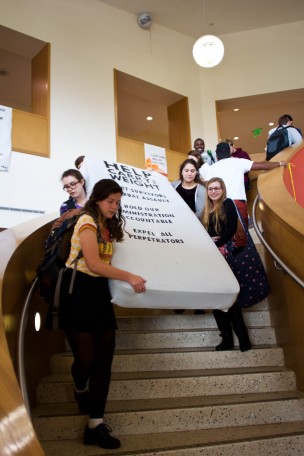
A group of students involved with the Feminist Co-op carried a mattress to various prominent campus locations on Thursday, Oct. 29 as part of the national Help Carry That Weight campaign.
The campaign, hosted at more than one hundred colleges across the country, is an expression of support for Emma Sulkowicz, a Columbia University student who is protesting her university’s lack of accountability in regard to punishing perpetrators of sexual assault. For the past two months, Sulkowicz has carried her mattress with her everywhere on campus in protest of her assaulter’s continued enrollment and presence on Columbia’s campus.
The Help Carry That Weight event at the University was organized by various members of the Feminist Co-op, including Chloe Murtagh ’15, Alicia Gansley ’15, Yiyang Wang ’15, Ryden Nelson ’16, Tess Altman ’17, and Isabel Alter ’17.
Altman said that Sulkowicz’s activism has become a national rallying point for those confronting how college administrations handle sexual assault cases.
“She was sexually assaulted on that mattress and vowed that she would carry it around until the university expelled her perpetrator,” Altman said. “It’s become this national symbol around this issue in the last month or so.”
The mattress itself was intended to act as both a show of support for Sulkowicz and a reminder to the administration of its responsibilities.
Before the event, the Feminist Co-op posted a schedule on Facebook of where the mattress would be throughout the day and created shifts for those carrying it. Candace Powning ’18 and Natalie May ’18 both carried the mattress from Fountain Avenue to the Usdan University Center in the evening. Powning stated that she believes the mattress serves as a reminder to the administration of students’ concerns.
“What’s happened to [Sulkowicz] at Columbia is a really important issue on many college campuses.” Powning said. “…Clearly a school, Columbia, that’s very liberal, very invested in their students, is not being accountable and behaving correctly in light of these issues. We’ve seen it here at Wesleyan as well, the administration not behaving how the student body feels they should…. [The mattress is] a message to the students, but it’s also a message to the administration saying that we’re aware of where they’re fucking up and where to pay more attention.”
According to Altman, the Feminist Co-op had originally planned to write a list of policy demands on the mattress, but decided against it to appeal to a broader audience.
“I think there have been events surrounding [specific policy recommendations], and I think there is a time and a place for that, but I think it was more so to have this public display of support,” Altman said. “It’s always hard because whenever we do anything we have to think about who the audience is and what are we saying. I think that often it’s hard because it’s different. Often you’re not just sending messages to the students, you’re not just sending messages to the administration, you’re sending it to multiple people.”
Altman elaborated further on the message the mattress was intended to portray to the University administration.
“It was saying ‘Look, people still care,’ because I feel like at Wesleyan you have to reaffirm that you still care every few weeks; otherwise, it drops by the wayside with all the other causes at Wesleyan that people are fighting for,” Altman said. “I think it’s less saying, ‘We need to hold [the adminstration] accountable in these ways,’ and more saying, ‘We are holding you accountable. We still care and we’re still going to. It’s not going to end when a certain class graduates; you’re going to keep being held accountable. You can’t wait it out because we’re right here; we’re in Usdan with a mattress.’”
May also spoke to how attention-calling a protest involving a large, unavoidable object is.
“[At] Wesleyan, because we feel like we’re such a liberal community, and we are, it’s important to have initiatives of all different types that might be more jarring, more provocative,” May said.
Altman asserted that having the mattress occupy common spaces made it more representative of student voices.
“You can’t deny a big mattress taking up so much room in a space like that,” Altman said. “It’s really important to think of Usdan and some of those really main spaces on campus as our spaces and spaces that students occupy…. I think that bringing activism to those places is a way of reasserting ourselves and saying this is our school and these are things that we care about at our school, right here. It’s becoming so much larger…. That’s how I thought about what happened today: saying we’re a part of this national discussion. Yes, it’s an issue at Wesleyan; it’s an issue in so many other places, and we’re engaged in that.”


Leave a Reply